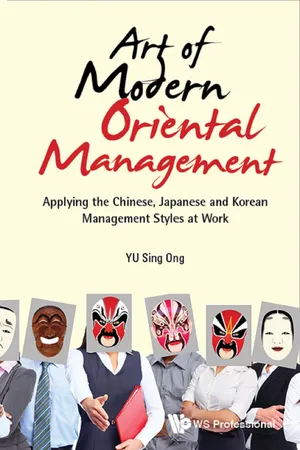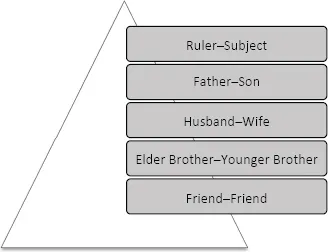![]()
Influences of Philosophy and Religion
![]()
Chapter
Confucianism
Confucius (551 B.C.–479 B.C.) had a great influence on Chinese culture. He advocated the concept of ren (“humanity”, “humanness”, “goodness” or “benevolence”). Confucius also viewed individuals as a social being whose identity derives from his interaction with the broader human community. He preached personal virtues, social order and respect for elders. Ren encompasses qualities such as self-discipline, humility, loyalty, courage and trustworthiness.
Mencius (Meng Ke or Meng Zi), born in 372 B.C. carried on Confucius’ philosophy. He introduced the concept of democracy by emphasising that subjects are more important the rulers. He also advocated that one’s character needed to be moulded by education. On leadership, Mencius emphasised that a wise leader is one who portrays benevolence and righteousness.
Mencius said:
“If a king shares the worries and concerns of his subjects and makes policies that enable them to live and work in peace and contentment, there is no force in existence that can stop him uniting the world.” (Xu & Zhang, 2007)
Mencius believed that individuals are good by nature and that it is society’s bad influence that causes bad moral characters. This assertion put Mencius in greater agreement with Daoism than with Confucianism. While this may seem paradoxical, Confucius himself did not provide any theory on human nature and/or elaborate why a person should be moral.
Confucianism focuses on the manner human beings ought to behave in society according to ethical or moral ways. It does not offer any explanations on the relationships between human beings and Nature. By overly emphasising on human ideals or standards, it can be argued that Confucianism has placed too much emphasis on worldly goals.
Daoists realise that human beings are only a miniscule part of the larger process of Nature. Human nature in its original pristine form can only be understood to be “so of itself ” (ziran or naturalness). When human nature is aligned with Nature, order and harmony are the results.
In Daoism, self-cultivation is an important element in the search for meaning of human nature. Through self-cultivation, a Daoist seeks to return to a state of existence which is in harmony with Nature. Selfishness and ill intentions often result in disharmonies and unintended consequences which are against the natural rhythms of Nature.
From this perspective, the author postulates that Daoism had influenced Mencius’ views on human nature. Mencius believed that human nature is good as it is one’s innate tendencies to be benevolent, self-righteous, and proprietous. “Evil”, on the other hand, is not inborn but something artificial from outside. Mencius asserted that serious efforts need to be made to return to one’s original nature. This return to one’s original nature is synonymous to the concept of self-cultivation in Daoism.
Confucianism focuses on moral character and ethics which encompass Five Constants or wu chang (五常). They are:
1. Ren (仁), humaneness, benevolence;
2. Yi (义), righteousness, justice;
3. Li (礼), proper rite;
4. Zhi (智), knowledge, wisdom;
5. Xìn (信), integrity.
Describing ren, Confucius advised “not to do to others as you would not wish done to yourself ”. He believed that man is kind and good by nature and should not seek wealth and status at the expense of humanity. A Confucian manager is expected to display goodness towards others and manage with kindness.
Yi, an ethical orientation of Confucianism, refers to the moral dispositions to do good. Individuals should have the ability to recognise what is right and good. Certain actions have to be taken for the sole reason they are right regardless of the outcomes. In this respect, managers are expected to uphold the highest standards of moral conduct.
The Confucian concept of li refers to rituals or appropriate behaviours and roles. Li promotes ideals such as filial piety, faith and loyalty. Illustrating the broader application of li, Confucius included broad topics such as learning, titles and governance. Li regulates human interactions and etiquettes and lays the basis for the principles of social order.
Mencius added the concept of Zhi to Confucianism. Zhi refers to moral wisdom and knowing right from wrong. According to Mencius, “evil” could originate from lack of knowledge of external circumstances. Zhi is part of the growing maturation of an individual as wisdom comes with age.
Xin refers to keeping one’s words and being faithful. Faithfulness is an indispensable virtue for a person. A man without faith could not be entrusted to carry out important tasks. Trust is an utmost important virtue of a leader as honest and faithful leaders are needed to maintain a harmonious organisation.
Face-saving is an important Chinese business concept which could be traced back to Confucius. Lian (face) reflects one’s standing in public. Criticism from another party to cause one to lose face may jeopardise the business relationships between the parties.
Confucius believed that education should be provided to all without any discrimination. According to him, education can make a difference to a person’s character. One of the most important contributions of Confucius is that he advocated that all humans are equal and of one class.
Confucius said:
“When you see a worthy person, endeavor to emulate him. When you see an unworthy person, then examine your inner self.”
Confucius advocated the five relationships model to determine ruler– subject, father–son, husband–wife, elder brother–younger brother and friend–friend relationships (Figure 1). Because of the hierarchical nature, titles are important. Chinese (including Japanese and Koreans) address each other by the appropriate titles: “Mr Wong”, “President Lee” or “General Ng”.
Figure 1: Confucianism on Relationships
![]()
Chapter
Confucian Influences on Modern Management
Much of Confucius’ ideology could be applicable in modern-day management practices.
Confucius said:
1) “
Success depends upon previous preparation, and without such preparation there is sure to be failure.”
Businesses have to be sufficiently prepared to face the challenges in the global environment. Managers have to constantly conduct scenario planning exercises to ensure that they are adequately prepared for any downturns.
2) “
If you think in terms of a year, plant a seed; if in terms of 10 years, plant trees; if in terms of 100 years, teach the people.”
Confucius highlighted the importance of formulating strategies to develop competitive advantage in the business. This strategic plan is to be put into action through proper planning and organisation.
3) “
Better a diamond with a flaw than a pebble without.”
Managers should value righteousness and ethical principles above profits. Their business behaviours should be governed by high moral and ethical principles.
4) “
Let the ruler be a ruler, the subject a subject, a father a father, and a son a son.”
The concept of absolute loyalty towards one’s organisation is becoming increasingly unpopular. As employees become more educated and exposed to Western management styles, their demands for greater recognition of their work performances increase. Increased competition for talents means that the mobility rate of employees also increases. The expectation that employees work tirelessly for the good of the organisation and the nation as stated in the Analects of Confucius seems unrealistic in modern times as employees are now inclined towards work-life balance.
Mencius’ contribution to modern-day management is in the area of participative management and employee autonomy. He stressed that leaders should also learn from their subordinates.
Mencius said:
“Today there are many states, all equal in size and virtue, none being able to dominate the others. This is simply because the rulers are given to employing those they can teach rather than those from whom they can learn.”
Mencius also taught the need for good interpersonal relationship between superior and subordinate. Managers have to earn the support and respect of their subordinates if they wish to achieve greater goals.
Mencius quoted:
“You can never gain the Empire without the heartfelt admiration of the people in it.”
Mencius’ teaching could be ...




